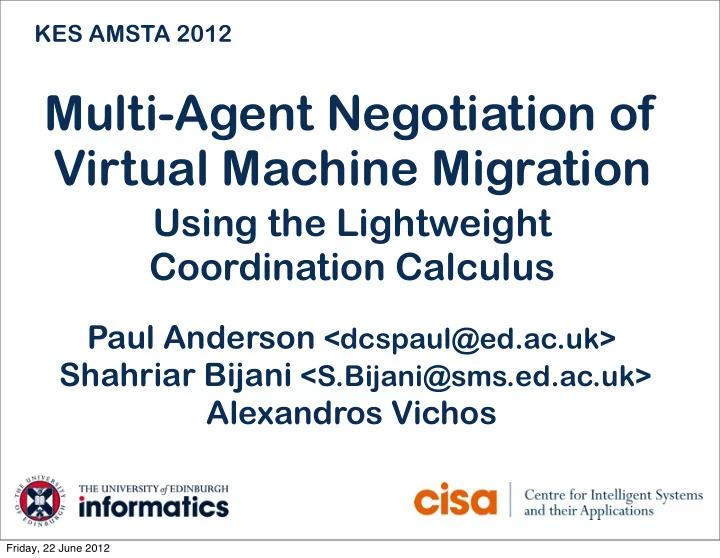

KES AMSTA 2012 Multi-Agent Negotiation of Virtual Machine Migration Using the Lightweight Coordination Calculus Paul Anderson <dcspaul@ed.ac.uk> Shahriar Bijani <S.Bijani@sms.ed.ac.uk> Alexandros Vichos Friday, 22 June 2012
Current State Deployment Text Requirements Text Specification Plan Final State Friday, 22 June 2012
Centralised Configuration? ◼ Centralised configuration - allows a global view with complete knowledge ◼ But ... - it is not scalable - it is not robust against communication failures - federated environments have no obvious centre - different security policies may apply to different subsystems ◼ The challenge ... - devolve control to an appropriately low level - but allow high-level policies to determine the behaviour Friday, 22 June 2012
GPrint (2003) PRINT CONTROLLER GLOBUS SmartFrog SERVER LCFG Daemon Print Print Manager Monitor Gprint OGSA Portal LCFG SLP print queue announcements SLP printer announcements PRINT SERVER Heartbeat SmartFrog LCFG Daemon Print LCFG lpd Server component Printer ◼ Distributed configuration with centralised policy ◼ Subsystem-specific mechanisms Friday, 22 June 2012
“OpenKnowledge” & LCC ◼ Agents execute “interaction models” ◼ Wrien in a “lightweight coordination calculus” (LCC) ◼ This provides a very general mechanism for doing distributed configuration ◼ Policy is determined by the interaction models themselves which can be managed and distributed from a central point of control ◼ The choice of interaction model and the decision to participate in a particular “role” remains with the individual peer - and hence, the management authority Friday, 22 June 2012
A Simple LCC Example a(buyer, B) :: ask(X) => a(shopkeeper, S) then price(X,P) <= a(shopkeeper, S) then buy(X,P) => a(shopkeeper, S) ← afford(X, P) then sold(X,P) <= a(shopkeeper, S) a(shopkeeper, S) :: ask(X) <= a(buyer, B) then price(X, P) => a(buyer, B) ← in_stock(X, P)then buy(X,P) <= a(buyer, B) then sold(X, P) => a(buyer, B) Friday, 22 June 2012
An Example: VM Allocation migrate overloaded underloaded ◼ Policy 1 - power saving - pack VMs onto the minimum number of physical machines ◼ Policy 2 - agility - maintain an even loading across the physical machines Friday, 22 June 2012
A Prototype Distributed Discovery Service Interaction Components models Peer matching Physical machine Physical machine OK peer OK peer libvirt libvirt OS OS Virtual Machines Virtual Machines Friday, 22 June 2012
An Idle Host a(idle, ID1) :: null ← overloaded(Status) then a(overload(Status), ID1) ) or ( null ← underloaded(Status) then a(underload(Status), ID1) ) or ( a(idle, ID1) ) Friday, 22 June 2012
An Overloaded Host a(overloaded(Need), ID2) :: readyToMigrate(Need) => a(underloaded, ID3) then migration(OK) <= a(underloaded, ID3) then null ← migration(ID2, ID3) then a(idle, ID2) Friday, 22 June 2012
An Underloaded Host a(underloaded(Capacity), ID3) :: readyToMigrate(Need) <= a(overloaded, ID2) then migration(OK) => a(overloaded, ID2) ← canMigrate(Capacity, Need) then null ← waitForMigration() then a(idle, ID3) Friday, 22 June 2012
Migration Example 1 1 3 2 8 2 4 6 8 4 6 3 5 9 7 9 7 5 PM1 PM2 PM3 PM4 PM1 PM2 PM3 PM4 Friday, 22 June 2012
Simulation Physical Machine Load Average (%) 200 150 120% average load 100 80% average load 50 0 0 5000 10000 15000 20000 Time (ms) Friday, 22 June 2012
Protocol Issues ◼ The simple protocols described here are very naive - But the flexibility of the framework is the real contribution - LCC can easily be used to implement more sophisticated protocols - such as “auctions” which are ideal for many configuration scenarios ◼ The protocols so far rely rather heavily on the “discovery service” - This seems against the spirit of peer negotiation - We are investigating other protocols which (for example) search for suitable exchange candidates by passing requests to a local peer group who will then forward them if they cannot satisfy them Friday, 22 June 2012
Measurement Issues ◼ Unpredictability of virtual machine performance is a significant problem - Latency is high for machine migrations - We are looking at machine learning techniques to identify (for example) “stable” and “unstable” machines ◼ In practice, machine “load” is multi-dimensional - We may want to consider cpu usage, memory usage and network (for example) - we are looking at ways of incorporating different factors Friday, 22 June 2012
General Issues ◼ We would like to evaluate the approach in a more production environment, but ... - Handling errors and timeouts in an unreliable distributed system is hard - We have been using a research implementation of lcc which is not very robust ◼ Some things are hard to do without global knowledge - balance the system so that all the machines have exactly the same load? Friday, 22 June 2012
KES AMSTA 2012 Multi-Agent Negotiation of Virtual Machine Migration Using the Lightweight Coordination Calculus Paul Anderson <dcspaul@ed.ac.uk> Shahriar Bijani <S.Bijani@sms.ed.ac.uk> Alexandros Vichos Friday, 22 June 2012
Recommend
More recommend